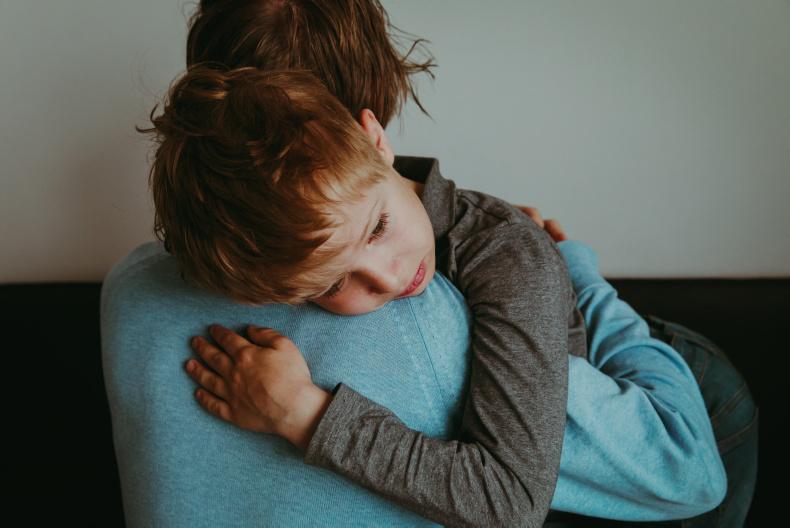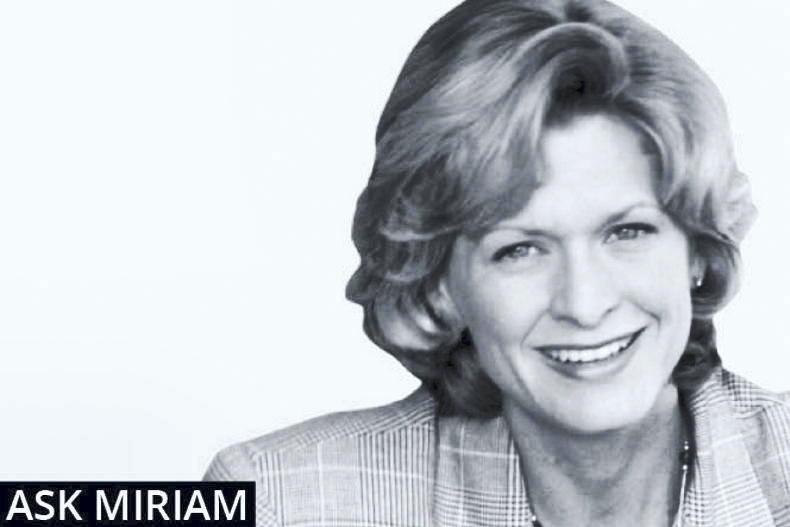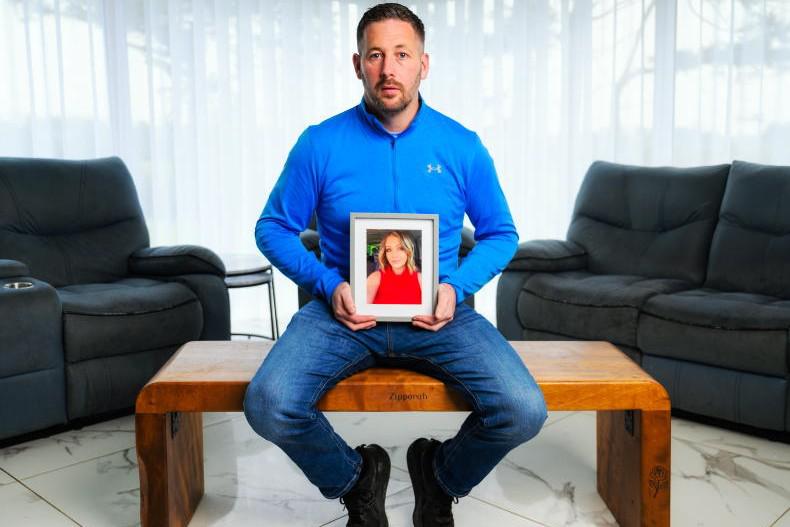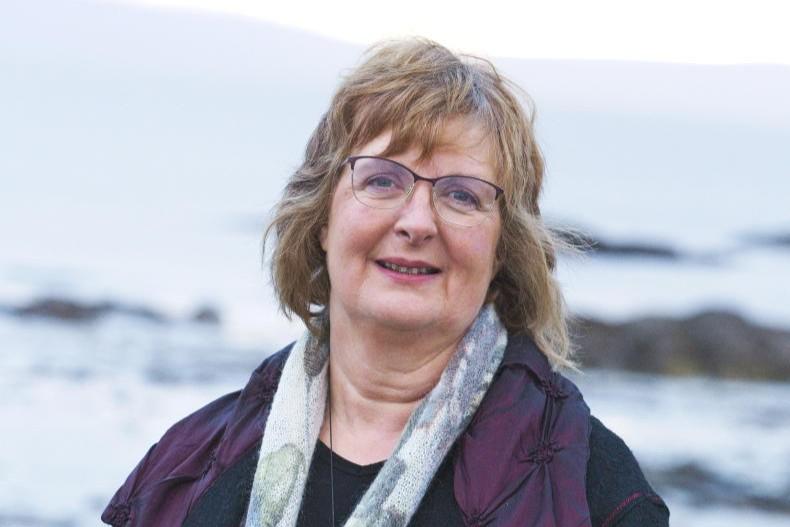Think of it as splashing in puddles rather than wading in a river. That’s how Bríd Carroll, psychotherapist and chairperson of the Irish Childhood Bereavement Network, explains the difference between how children and adults grieve.
“Children don’t grieve the same as adults,” she says. “We find that we, as adults, end up in the river of grief and it takes us time to come out the other side. But for children, the pain or intensity of grief is too much, so we often describe how it affects them as being like splashing in puddles. The grief comes up sometimes and then disappears completely. Children may be all right during the day, for example, but then at bedtime they may tumble out all their worries. It’s about recognising that the grief won’t be there all of the time.”
No two children will grieve in the same way, of course. While one child may pull away and be very quiet, another child could be visibly upset.
“Younger children won’t actually realise the impact of the permanency of the loss at the time,” she says.
Be led by the child's questions
Children should be told of a death by an adult close to them, preferably a parent, and adults should be led by the children’s questions.
“I know it is so hard when it is another parent who has just died,” she says, “but it is so important that it is someone close to the child that sits them down and says: ‘Look, there has been an accident, this is what has happened. Age appropriate language should be used and you shouldn’t be afraid as an adult to say that you don’t have the answer to some of their questions. In that situation, you say, ‘Let me find that information for you’. Don’t just give an answer for the sake of giving an answer. Children need reliable information.”
Majority will come through it if well supported
The majority of children, even those bereaved by traumatic deaths like farm accidents, will come through well if they have a good support network, she says.
“That’s usually family, friends, school and community organisations. They need to know that someone can hear them in their grief and understand their grief. Children don’t have school and sports at the moment, so the key mentors who could monitor them in their grief can’t be there for them unfortunately.”
The Irish Childhood Bereavement Network (ICBN) is there to help parents support their children through grief, while they grieve themselves at the same time.
“It is possible to do both – sometimes people feel it isn’t but it is,” she says. Parents are guided to local support services by the ICBN, depending on the degree of impact that bereavement is having on their child.
Lack of funeral rituals has an impact
COVID-19 restrictions at funerals have been a major disadvantage for grieving children, Bríd believes.
“The rituals of funerals and wakes, which help people grieve, are not there in the same way at the moment.”
When taking calls from parents looking for support, Bríd has recently been hearing of many children – particularly in the seven to nine age groups – who are “acting out” because of bereavement during the lockdown.
“These are children who wouldn’t normally be like this, so there is a little level of aggression going on. They are actually acting out their grief from early in the lockdown, rather than being able to talk about it because they don’t know what’s wrong with them. They will tell you that in the middle of their frustration.
“Pre-schoolers, I know can be very clingy and upset at bedtime also – that’s what I’m hearing from parents. The fear for them can be: ‘I’ve lost one person in my family and it’s going to happen to you too.’
Acting out, especially at bedtime
Parents are also telling the ICBN that they find it difficult to get their bereaved children to bed.
“This stroppiness can surface, with the child’s grief manifesting itself in tears or anger. It is literally the frustration that is in the child where they cannot fully express their feelings because they don’t have the language to express what’s going on.”
Children between 10-14 years may act as if there is nothing going on, however.
“Often when there is a loss parents are saying, ‘Gosh they’re behaving as if nothing is wrong’ but it’s actually that age of early teens where they are thinking, ‘Death is not supposed to come in on my agenda, I’m supposed to be out with my friends and this shouldn’t be happening in my family’. Literally they will go into denial mode, not wanting to know this happened. It is their way of coping with it. It may be years after their loss that they deal with their grief.”
COVID-19: like living through chronic grief
Bríd Carroll’s opinion of the whole COVID-19 lockdown experience is that it has been like living through chronic grief.
“We are suspended in time, in uncertainty. We don’t know where we are going. If we couldn’t understand how surreal the lockdown experience was as adults, how could a child understand that?”
Warning signals - withdrawing
Children who begin to give up their activities and pull away from their friends are the ones we need to worry about, she says.
“Activities are so important in keeping the everyday regulated,” she says.
“OK, your grief comes up from time to time, but it can be managed by the distraction of activities. If a child actually starts withdrawing from activities, it is something to watch out for.”
Cildren live in the moment
While parents worry that bereavement will affect their children long into the future, death is not as complex for them as it is for adults, she says.
“Children live more in the moment. They don’t see it in complex terms and they can be very graphic in the sense that they see it as it is and they name it as it is. It can be so tough for a parent when they name it openly and harshly in concrete terms.
“Parents may be shuddering at the conversation they are having. ‘They’re dead now and don’t you know they’re dead?’ That concrete kind of conversation that can be so hard for parents.”
Children blame themselves wrongly
Adults also have to help children not to blame themselves after a death in their family.
“It’s so important after accidents, particularly because children at the ages of 10-12 so often feel that they are to blame for what happened. They may think: ‘I had a row with my brother yesterday and he died today and it was the row that caused that’.
“They carry a fear that what they thought or what they said is to blame for it. As adults, we really have to reassure them that nothing they thought or said can actually cause somebody else to die. That is so important, especially if it is a sibling who has died. Siblings bonds can be very close, although they can also fight like demons at times.
“We mustn’t forget the child’s grief and the very unique relationships that exist in the family. They can often be forgotten somewhat, because parents are so caught up in the grief of what has happened, along with trying to process all it entails for the family’s life and a business like a farm.”
A choice about what they want to doTo be included when the rituals come up – wakes, funerals, memorial services.Reliable information.Routine.Affection.To have feelings acknowledged and expressed.Someone to role model grief for them – to see someone cry and explain that that’s OK, that bad days happen, but to remember that tomorrow may be better.Be given time to remember, reminisce and attend wakes if possible.Professionals use what’s called The Irish Childhood Bereavement Pyramid to assess the level of support a grieving child needs.
“There are four levels on it with level one – the baseline – being where children cope with natural support from family and friends.
“Level two is where they get extra support through something like the Rainbow programme in schools and communities.
“Level three is for the small number of children who may be over-anxious or withdrawn or blaming themselves and need some one-to-one.
“Above that would be children with intellectual disabilities or mental health issues, who may need some more child and adolescence intervention.
“That pyramid gives us our guide about where to refer children when parents telephone or email us at the Irish Childhood Bereavement Network office, which is housed with the Irish Hospice Foundation.”
The Irish Childhood Bereavement Network can be contacted at www.childhoodbereavement.ie or by phoning 01-679 3188.
Parents who ring or email for support will be signposted to support services available in their locality.
New national bereavement support helpline
COVID-19 has put grief on the agenda like never before. Bríd Carroll states: “Because of COVID-19, the HSE and the Irish Hospice Foundation (IHF) got together to launch a National Bereavement Support Helpline – 1800 80 70 77 – 10am to 1pm Monday to Friday and already many people are using it.”
In response to the COVID-19 pandemic, the IHF has also established a new Care and Inform hub on its website www.ihf.ie to provide resources on grief and loss and offer supports during the bereavement process.
For more tips about helping children grieve during COVID-19 restrictions, see the following website pages:
www.childhoodbereavement.ie/families/ and
hospicefoundation.ie/bereavement-2-2/covid19-care-and-inform/grieving-in-exceptional-times/
Think of it as splashing in puddles rather than wading in a river. That’s how Bríd Carroll, psychotherapist and chairperson of the Irish Childhood Bereavement Network, explains the difference between how children and adults grieve.
“Children don’t grieve the same as adults,” she says. “We find that we, as adults, end up in the river of grief and it takes us time to come out the other side. But for children, the pain or intensity of grief is too much, so we often describe how it affects them as being like splashing in puddles. The grief comes up sometimes and then disappears completely. Children may be all right during the day, for example, but then at bedtime they may tumble out all their worries. It’s about recognising that the grief won’t be there all of the time.”
No two children will grieve in the same way, of course. While one child may pull away and be very quiet, another child could be visibly upset.
“Younger children won’t actually realise the impact of the permanency of the loss at the time,” she says.
Be led by the child's questions
Children should be told of a death by an adult close to them, preferably a parent, and adults should be led by the children’s questions.
“I know it is so hard when it is another parent who has just died,” she says, “but it is so important that it is someone close to the child that sits them down and says: ‘Look, there has been an accident, this is what has happened. Age appropriate language should be used and you shouldn’t be afraid as an adult to say that you don’t have the answer to some of their questions. In that situation, you say, ‘Let me find that information for you’. Don’t just give an answer for the sake of giving an answer. Children need reliable information.”
Majority will come through it if well supported
The majority of children, even those bereaved by traumatic deaths like farm accidents, will come through well if they have a good support network, she says.
“That’s usually family, friends, school and community organisations. They need to know that someone can hear them in their grief and understand their grief. Children don’t have school and sports at the moment, so the key mentors who could monitor them in their grief can’t be there for them unfortunately.”
The Irish Childhood Bereavement Network (ICBN) is there to help parents support their children through grief, while they grieve themselves at the same time.
“It is possible to do both – sometimes people feel it isn’t but it is,” she says. Parents are guided to local support services by the ICBN, depending on the degree of impact that bereavement is having on their child.
Lack of funeral rituals has an impact
COVID-19 restrictions at funerals have been a major disadvantage for grieving children, Bríd believes.
“The rituals of funerals and wakes, which help people grieve, are not there in the same way at the moment.”
When taking calls from parents looking for support, Bríd has recently been hearing of many children – particularly in the seven to nine age groups – who are “acting out” because of bereavement during the lockdown.
“These are children who wouldn’t normally be like this, so there is a little level of aggression going on. They are actually acting out their grief from early in the lockdown, rather than being able to talk about it because they don’t know what’s wrong with them. They will tell you that in the middle of their frustration.
“Pre-schoolers, I know can be very clingy and upset at bedtime also – that’s what I’m hearing from parents. The fear for them can be: ‘I’ve lost one person in my family and it’s going to happen to you too.’
Acting out, especially at bedtime
Parents are also telling the ICBN that they find it difficult to get their bereaved children to bed.
“This stroppiness can surface, with the child’s grief manifesting itself in tears or anger. It is literally the frustration that is in the child where they cannot fully express their feelings because they don’t have the language to express what’s going on.”
Children between 10-14 years may act as if there is nothing going on, however.
“Often when there is a loss parents are saying, ‘Gosh they’re behaving as if nothing is wrong’ but it’s actually that age of early teens where they are thinking, ‘Death is not supposed to come in on my agenda, I’m supposed to be out with my friends and this shouldn’t be happening in my family’. Literally they will go into denial mode, not wanting to know this happened. It is their way of coping with it. It may be years after their loss that they deal with their grief.”
COVID-19: like living through chronic grief
Bríd Carroll’s opinion of the whole COVID-19 lockdown experience is that it has been like living through chronic grief.
“We are suspended in time, in uncertainty. We don’t know where we are going. If we couldn’t understand how surreal the lockdown experience was as adults, how could a child understand that?”
Warning signals - withdrawing
Children who begin to give up their activities and pull away from their friends are the ones we need to worry about, she says.
“Activities are so important in keeping the everyday regulated,” she says.
“OK, your grief comes up from time to time, but it can be managed by the distraction of activities. If a child actually starts withdrawing from activities, it is something to watch out for.”
Cildren live in the moment
While parents worry that bereavement will affect their children long into the future, death is not as complex for them as it is for adults, she says.
“Children live more in the moment. They don’t see it in complex terms and they can be very graphic in the sense that they see it as it is and they name it as it is. It can be so tough for a parent when they name it openly and harshly in concrete terms.
“Parents may be shuddering at the conversation they are having. ‘They’re dead now and don’t you know they’re dead?’ That concrete kind of conversation that can be so hard for parents.”
Children blame themselves wrongly
Adults also have to help children not to blame themselves after a death in their family.
“It’s so important after accidents, particularly because children at the ages of 10-12 so often feel that they are to blame for what happened. They may think: ‘I had a row with my brother yesterday and he died today and it was the row that caused that’.
“They carry a fear that what they thought or what they said is to blame for it. As adults, we really have to reassure them that nothing they thought or said can actually cause somebody else to die. That is so important, especially if it is a sibling who has died. Siblings bonds can be very close, although they can also fight like demons at times.
“We mustn’t forget the child’s grief and the very unique relationships that exist in the family. They can often be forgotten somewhat, because parents are so caught up in the grief of what has happened, along with trying to process all it entails for the family’s life and a business like a farm.”
A choice about what they want to doTo be included when the rituals come up – wakes, funerals, memorial services.Reliable information.Routine.Affection.To have feelings acknowledged and expressed.Someone to role model grief for them – to see someone cry and explain that that’s OK, that bad days happen, but to remember that tomorrow may be better.Be given time to remember, reminisce and attend wakes if possible.Professionals use what’s called The Irish Childhood Bereavement Pyramid to assess the level of support a grieving child needs.
“There are four levels on it with level one – the baseline – being where children cope with natural support from family and friends.
“Level two is where they get extra support through something like the Rainbow programme in schools and communities.
“Level three is for the small number of children who may be over-anxious or withdrawn or blaming themselves and need some one-to-one.
“Above that would be children with intellectual disabilities or mental health issues, who may need some more child and adolescence intervention.
“That pyramid gives us our guide about where to refer children when parents telephone or email us at the Irish Childhood Bereavement Network office, which is housed with the Irish Hospice Foundation.”
The Irish Childhood Bereavement Network can be contacted at www.childhoodbereavement.ie or by phoning 01-679 3188.
Parents who ring or email for support will be signposted to support services available in their locality.
New national bereavement support helpline
COVID-19 has put grief on the agenda like never before. Bríd Carroll states: “Because of COVID-19, the HSE and the Irish Hospice Foundation (IHF) got together to launch a National Bereavement Support Helpline – 1800 80 70 77 – 10am to 1pm Monday to Friday and already many people are using it.”
In response to the COVID-19 pandemic, the IHF has also established a new Care and Inform hub on its website www.ihf.ie to provide resources on grief and loss and offer supports during the bereavement process.
For more tips about helping children grieve during COVID-19 restrictions, see the following website pages:
www.childhoodbereavement.ie/families/ and
hospicefoundation.ie/bereavement-2-2/covid19-care-and-inform/grieving-in-exceptional-times/









SHARING OPTIONS